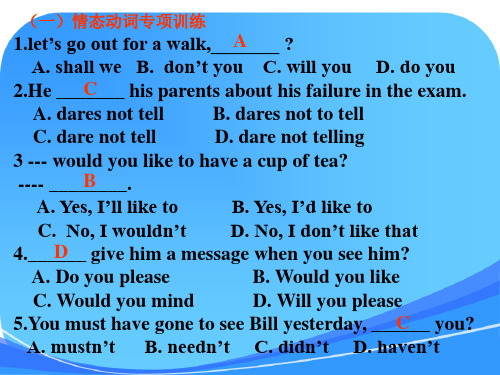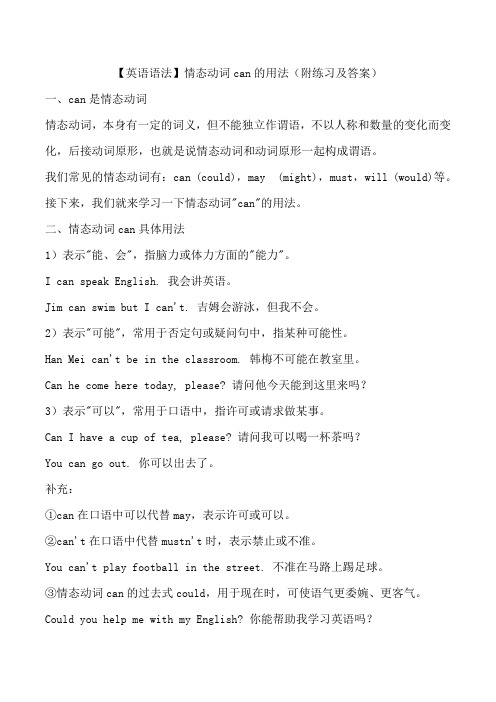语法专项情态动词
小学专项练习题情态动词的用法练习及

小学专项练习题情态动词的用法练习及小学专项练习题情态动词的用法练习及解析情态动词是英语中一个非常重要的语法结构,它们不仅可以表达说话者的意愿、推测、建议等情感,而且可以用来强调特定的观点、态度和描述,因此是学习英语时必须掌握的一部分。
本文将为大家介绍小学阶段常见的情态动词,并提供一些练习题供大家练习。
1. Can和Could的用法Can和Could均可以表示能力、许可和请求,但它们用法略有不同,Can常用于肯定句,Could常用于疑问句或询问礼貌。
例如:1)I can swim in the pool.(我能在游泳池里游泳。
)2)Could you help me with my homework?(你能帮我做作业吗?)练习题:用Can或Could填空1)_____ you pass me the salt, please?(能把盐递给我吗?)2)I _____ play the piano when I was three years old.(我三岁时就能弹钢琴。
)3)_____ I borrow your pen for a moment, please?(我能借下你的笔吗?)4)My sister _____ draw a picture very well.(我妹妹会很好地画画。
)答案:1)Could;2)Could;3)Can;4)Can2. Should和Must的用法Should表示建议或期望,而must表示强制和义务。
例如:1)You should brush your teeth twice a day.(你应该一天刷两次牙。
)2)You must wear a seatbelt in the car.(你必须在车上系安全带。
)练习题:用should或must填空1)You _____ finish your homework before watching TV.(你在看电视之前必须完成作业。
初中英语语法专项练习-情态动词

---- ______ Of course, please.And I’d rather he ______
me the truth.
A. Will;inform
C. dare not tell
D. dare not telling
3 --- would you like to have a cup of tea? ---- ____B____.
A. Yes, I’ll like to
B. Yes, I’d like to
C. No, I wouldn’t D. No, I don’t like that
A. be, should have been B. am, should be
C.should be, be D. have been, should have been 7.___C___ out of season, I would have ordered some from
the fruit stand.
(一)情态动词专项训练
1.let’s go out for a walk,___A____ ?
A. shall we B. don’t you C. will you D. do you
2.He ___C____ his parents about his failure in the exam.
A. dares not tell B. dares not to tell
A. If oranges would have been
B. If oranges have not been
C.Had oranges not been
D.Should oranges not have been
语法专题八 情态动词【考点精讲精练】-2023年中考语法一点通(学生版)

考点精讲情态动词表示讲话人的态度、请求、许可、愿望、可能等。
本身具有一定的意义,但不能独立作谓语,没有人称和数的变化,且后面必须跟动词原形。
常考的情态动词有:can/could(能够,可以),may/might(可能,可以),must(必须,一定),should(应该),need(必要),have to(不得不)等。
Need用作情态动词时常用于否定句和疑问句,need还可作实意动词,常用结构need to do sth.考点1.情态动词+动原➢He can play the violin. 他会拉小提琴。
➢It might snow tomorrow. 明天可能下雪。
➢We should respect everyone. 我们应该尊重每一个人。
考点2.常考的一般疑问句的回答—Can you swim?—Yes, I can. /No, I can’t.—May I smoke here?—Yes, you may/can. /Sure. / Certainly. / Of course. /No, you mustn't / can’t.—Must we finish the work at once?—Yes,you must. /No,you needn't. / No,you don't have to.(must引导的一般疑问句的否定回答是常考点)考点3.must必须(强调主观看法)mustn’t表示禁止,不允许➢You must study harder this term. 你们这学期必须更加努力学习。
(说话者的个人看法)➢You mustn’t swim in the river. 你们千万不能去河里游泳。
(这条河禁止游泳)考点4.情态动词表推测表推测:由强到弱肯定:must 准是,一定can 可能could(可能)may (或许) might(大概)否定:can’t 不可能may/ might not 或许不能can 和could 表示推测,can 表示推测时,往往用于否定句和疑问句。
初中语法:情态动词知识点专项练习题

初中语法:情态动词知识点专项练习题一、情态动词单项选择题1.You shouldn’t ________ your daughter at home. She can receive better ________ at school. A.educate; educate B.education; educationC.educate; education D.education; educate【答案】C【解析】【详解】句意:你不应该在家教育你的女儿。
她应该在学校接受更好的教育。
考查词义辨析。
educate教育,动词;education教育,名词。
第一个空情态动词+动词的原形,故用动词;第二个空作宾语,故用名词。
故选C。
2.—Mum, I bought some strawberries on my way home.—Oh, you’re so sweet. But the strawberries ________ be put into the fridge for freshness. A.must B.can C.may D.need【答案】A【解析】【详解】句意:——妈妈,我在回家的路上买了一些草莓。
——哦,你真贴心。
但草莓必须放进冰箱保鲜。
考查情态动词辨析。
must必须;can能够;may可能;need需要。
根据“But the strawberries… be put into the fridge for freshness”及常识可知,水果一定得放在冰箱里才能保鲜,故选A。
3.Look at the sign. You’d better ________ in the school library.A.stop to talk B.stop talking C.to stop to talk D.to stop talking【答案】B【解析】【详解】句意:看这个标志。
你最好不要在学校图书馆里说话。
初中语法:情态动词知识点专项练习题

初中语法:情态动词知识点专项练习题一、情态动词单项选择题1.You’d better________ the light when your hands are wet.A.put in B.to put up C.not put in D.not put up【答案】C【解析】【分析】【详解】句意:你手湿的时候最好不要安装灯。
考查非谓语动词及动词短语的用法。
put in安装(设备);put up张贴。
根据“You’d better… the light when your hands are wet”可知,手湿的时候不要安装灯,had better not do sth“最好不要做某事”,故选C。
2.—May I have some wine to drink?—No, you ________. You have to drive home later.A.mustn’t B.needn’t C.can’t D.may not【答案】A【解析】【详解】句意:——我可以喝点酒吗?——不,你不能。
你一会儿得开车回家。
考查情态动词。
mustn’t不可以,表禁止;needn’t不需要;can’t不可能;may not可能不是。
上句询问能否喝点酒,结合“drive home”可知,开车不能喝酒,表禁止,故用mustn’t。
故选A。
3.A hard-working man ________ become a great scientist, but a great scientist ________ be a hard-working man.A.can’t; can B.may not; must C.can’t; must D.may not; can【答案】B【解析】【详解】句意:一个努力的人可能不会成为一位伟大的科学家,但一位伟大的科学家一定是一个努力的人。
考查情态动词表推测。
第一个空,can’t表示“不能”或“不可能”,may not表示“可能不”,根据语境可知,努力的人可能成为伟大的科学家,也可能不会成为,因此排除选项A和C;第二个空,must be表示“一定是”,can be表示“有时是、可以是”,根据题干前半句和but 转折可知,此空应用肯定推测,即must be,排除选项D。
【英语语法】情态动词can的用法(附练习及答案)

【英语语法】情态动词can的用法(附练习及答案)一、can是情态动词情态动词,本身有一定的词义,但不能独立作谓语,不以人称和数量的变化而变化,后接动词原形,也就是说情态动词和动词原形一起构成谓语。
我们常见的情态动词有:can (could),may (might),must,will (would)等。
接下来,我们就来学习一下情态动词"can"的用法。
二、情态动词can具体用法1)表示"能、会",指脑力或体力方面的"能力"。
I can speak English. 我会讲英语。
Jim can swim but I can't. 吉姆会游泳,但我不会。
2)表示"可能",常用于否定句或疑问句中,指某种可能性。
Han Mei can't be in the classroom. 韩梅不可能在教室里。
Can he come here today, please? 请问他今天能到这里来吗?3)表示"可以",常用于口语中,指许可或请求做某事。
Can I have a cup of tea, please? 请问我可以喝一杯茶吗?You can go out. 你可以出去了。
补充:①can在口语中可以代替may,表示许可或可以。
②can't在口语中代替mustn't时,表示禁止或不准。
You can't play football in the street. 不准在马路上踢足球。
③情态动词can的过去式could,用于现在时,可使语气更委婉、更客气。
Could you help me with my English? 你能帮助我学习英语吗?三、情态动词can的基本句型1)肯定句型为:主语+can+动词原形+其它。
They can play basketball. 他们能打篮球。
语法篇专题情态动词和虚拟语气
用法
例句
can和could
表示能力
He can speak English better than you.
表示请求 或允诺?
You can have the book when I have finished it. Could you come again tomorrow?
表示客观可能性
should have done
过去本来应该……,而实际上没有……
The plant is dead. Maybe I should have given it more water.
ought to have done
过去本该……,而未……
You ought to have given him more help.
专题八 情态动词和虚拟语气
情态动词
一、情态动词 定义:情态动词是一种本身具有一定词义,但要与动词原形及其被动语态一起使用的词。它给谓语动词增添情态色彩,表示说话人对有关行为或事物的态度和看法,认为其可能、应该或必要等。 二、情态动词的特点 情态动词无人称和数的变化, 情态动词后面跟的动词需用原形,否定式构成是在情态动词后面加“not”。 个别情态动词有现在式和过去式两种形式, 过去式用来表达更加客气, 委婉的语气, 时态性不强, 可用于过去,现在或将来。情态动词属于非及物动词,故没有被动语态。
三、情态动词的语法特征 (1) 情态动词不能表示正在发生或已经发生的事情,只表示期待或估计某事的发生。 (2) 情态动词除ought 和have 外,后面只能接不带to 的不定式。 (3) 情态动词没有人称和数的变化,即其第三人称单数不加s。 (4) 情态动词没有非限定形式,即没有不定式,分词形式,也没有相应的动名词。 四、情态动词的基本用法
初中语法:情态动词知识点专项练习题
初中语法:情态动词知识点专项练习题一、情态动词单项选择题1.You’d better________ the light when your hands are wet.A.put in B.to put up C.not put in D.not put up【答案】C【解析】【分析】【详解】句意:你手湿的时候最好不要安装灯。
考查非谓语动词及动词短语的用法。
put in安装(设备);put up张贴。
根据“You’d better… the light when your hands are wet”可知,手湿的时候不要安装灯,had better not do sth“最好不要做某事”,故选C。
2.—I cannot find my pen. ________ I borrow yours?—Sure.A.Can B.Must C.Should D.Would【答案】A【解析】【详解】句意:——我找不到我的钢笔。
我可以借你的吗?——当然。
考查情态动词辨析。
can可以;must必须;should应该;would将。
根据“I borrow yours”可知,此处应用can表请求允许,希望能借对方的钢笔用一下,故选A。
3.—_________ I finish my homework now?—No, you _________. Your work is over today.A.Can’t; must B.Must; don’t have to C.May; couldn’t D.Couldn’t; could 【答案】B【解析】【分析】【详解】句意:——我必须现在完成作业吗?——不,你不必。
你今天的工作结束了。
考查情态动词辨析。
can’t不能,表能力或许可;must必须,强调主观意愿;don’t have to 不必;may可以,表许可;couldn’t不应该;could应该。
结合语境可知,must开头的一般疑问句,其否定回答用needn’t或don’t have to,故选B。
英语语法: 情 态 动 词
英语语法:情态动词英语语法:情态动词一、can和could1、can的用法(1)表示体力和脑力方面的能力。
(2)表示对现在的动作或状态进行主观的猜测,主要用在否定句和疑问句中。
(3)表示可能性,理论上的可能性,意为“有时候可能会”,可用于肯定句。
(4)表示允许,意思与may接近。
(5)表示说话人的推测、怀疑、惊异、猜测或不肯定等,主要用于否定句、疑问句或感叹句中。
(6)can的特殊句型cannot…too / enough表示“无论怎么。
也不过分”。
“越。
越好”。
cannot but+ do sth.表示“不得不,只好”。
2、could的用法(1)表示能力,指的是过去时间。
(2)表示允许,指的是过去时间。
(3)表示可能,可以指过去时间,也可以指现在时间,表示语气缓和。
(4)委婉客气地提出问题或陈述看法,指的是现在时间。
主要用于疑问句,回答时用can。
3、can与could的区别can表推测时只用于否定句和疑问句(could无此限制)。
couldn’t的可能性比can’t小。
4、can与be able to的区别(1)现在时:无区别,但后者不常用。
(2)完成时;can没有完成时,此时要用have(has,had)been able to。
(3)将来时:can没有将来时,要用will be able to。
(4)过去时:could表示一般能力,was/were able to 表示在具体场合通过努力成功做成某事的能力。
二、may 和might1、may的用法(1)表示询问或说明一件事可不可以做。
(2)表示一件事或许会发生或某种情况可能会存在,通常用在肯定句和否定句中。
注意:表示可能性时,can’t语气强,表示“不可能”,may not语气弱,表示“可能不”。
2、might的用法(1)表示询问或允许,指的是过去时间。
(2)表示可能发生的事,可以指过去时间,也可以指现在时间,语气更加不肯定,可能性比may小一些。
情态动词专项练习(含答案)
情态动词专项练习(含答案)1.They must be waiting for me impatiently as I promised to get there before 5 o'clock。
but now the rain is pouring down.2.Even though she had hurt her leg。
he was able to go back alone。
showing his bravery.3.You should pay too much n to your reading skill。
as it is so important.4.The car won't start no matter how many times I've tried.5.The old lady used to sit for hours doing nothing at all.6.Was there a small school here before?7.In summer。
the wind can be pretty cold as our house is on the top of the hill.8.I have told you that you will have the answer tomorrow morning。
haven't I?9.I was surprised that he failed in the match。
(Changed "should" to "was" as it is more appropriate in this context.)10.Shouldn't I go see my sick colleague right now。
(Changed "Better" to "Shouldn't" for better clarity.)11.Sir。
- 1、下载文档前请自行甄别文档内容的完整性,平台不提供额外的编辑、内容补充、找答案等附加服务。
- 2、"仅部分预览"的文档,不可在线预览部分如存在完整性等问题,可反馈申请退款(可完整预览的文档不适用该条件!)。
- 3、如文档侵犯您的权益,请联系客服反馈,我们会尽快为您处理(人工客服工作时间:9:00-18:30)。
语法复习专题情态动词
一、情态动词的类型:
只做情态动词的有:must, can(could), may(might)
可做情态动词也可做实义动词的有:need
可做情态动词也可做助动词的有:will(would), shall
具有情态动词的某些特征的有:have to, ought to
二、情态动词的特征:
1.有一定的词义,但不能单独作谓语,必须和行为动词或系动词连用,构成谓语。
2.无人称和数的变化。
(have to 例外:用于第三人称单数时用has to)
eg. He has to walk home.
3.后接动词原形。
4.具有助动词的作用,可用来构成否定句、疑问句及用于简明答语。
eg. ----Can you sing an English song?
----Yes, I can.
三、情态动词表推测(可能性)
否定推测:can’t---------→may not
2. (1)can、be able to 和could
①can和be able to都表示能力,意思上没多大区别。
但can只有现在和过去时,而be able to则有更多的形式。
但当成功地完成某一具体动作时,通常不用could而用was/were able to来表示。
这时was/were able to 相当于managed to,表示经过一番努力,终于能够完成某事。
如:
Can you use chopsticks?
The wounded man still was able to get to the village and was saved in the
end.
②can和could
提出问题或陈述看法,一般用could,回答时则用can。
如:
Could you help me carry the bag?
Can I help you?
(2)must
①must表示必须,应该,没有时态变化。
如:
You must do everything as I do.
②must表示肯定的推测。
如:
The light is still on, so he must be at home.
③mustn’t 表示禁止做某事。
如:
You mustn’t smoke in the office.
(2)may的用法
○1表示推测,意为“可能,也许”
○2表示请求,许可,意为“可以”
(3)need 的用法
need to do 为实义动词,用助动词提问或否定。
need doing .表被动
need do. 则need为情态动词,用need提问或回答。
1)---Could I borrow your dictionary?
---Yes, of course, you____.
A. might
B. will
C. can
D. should
答案B. will既可当作情态动词,表请求、建议、也可作为实义动词表"意愿、意志、决心",本题表示决心,选B。
3)---Don't forget to come to my birthday party tomorrow.
---______.
A. I don't
B. I won't
C. I can't
D. I haven't
2)---Shall I tell John about it?
---No, you ___. I've told him already.
A. needn't
B. wouldn't
C. mustn't
D. shouldn't。
